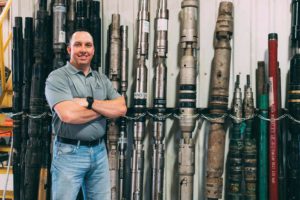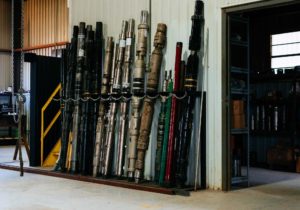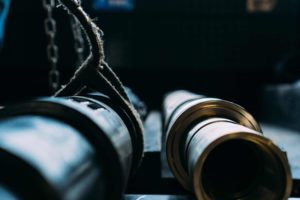“We’re just taking it day by day right now,” said Mesquite Oil Tools Owner/President Justin Pechacek.
“A lot of our stuff is workovers and completions. We’re not so much chasing the drilling side. We’ve been able and fortunate enough to stay really busy on the disposal side.”
Production increases based on previous drilling involves millions of gallons of produced water. That which is not recycled for fracturing goes into disposal wells, which Pechacek said are increasing dramatically even while drilling slows down.
“They’re drilling bigger well bores for bigger coated pipe,” requiring bigger downhole tools, which are stainless instead of the more traditional coated tools. Stainless gives 10-12 years of service instead of the five-year span typical with coated tools. The longer years of service offered by greater corrosion resistance allows a sort of “set and forget” mindset that producers are asking for in today’s price-squeezed market.
Adapting to shorter lead times for service have shrunk from eight weeks to one or two—and Pechacek says Mesquite has stayed busy by being able to adapt to those requirements.
Pechecek’s father founded the company in Snyder in 1985. Justin went to work for the company in 2009 and bought his father out in 2013. In addition to the home office in Snyder, Mesquite has locations in Big Spring, Monahans, Oklahoma, and one between Midland and Odessa on Industrial/ Business 20 across from the airport.
Producers rework existing wells
One source of growth for the company has involved producers who are refrac’ing older wells—much older wells. “In the Snyder area, we’re staying really busy with refracs because these guys are taking these stripper wells that are making 5-10 barrels a day, and [after the refrac] they’re coming in at 40-50,” Pechacek reported.
Most of the refracs are on wells drilled up to 75 years ago.
“With the technology now, you can get out so much further than you could a long time ago—you can really get it way back out there and get the returns that you couldn’t get to in the past.”
These refracs often do not involve sand because, he noted, that sand may come right back out in production in many of the older wells. These are usually slickwater gel fracs.
Added the company’s Shawn Moreland, “The technology of frac’ing’s come so far since those wells were drilled, now they can get into areas they couldn’t get into before.”
In these procedures, Pechacek and Moreland see producers finding creative ways to boost output without the expense of drilling new wells and creating new infrastructure for takeaway.
Casing leak solutions
Yet another market for downhole tool firms lies in isolating wellbores with casing leaks.
“You usually go in there and—you have a well that you don’t want to spend a lot of money on, popping cement to try to squeeze a leak—you can run a straddle system down there that we’ve got, and still be able to isolate your leak like you’re wanting, whether it’s producing water or it’s just bad.” Then the producer can either treat the backside or vent gas out. “This is relatively cost-effective and it’s working really well. They’re kind of going off like hotcakes.”
This spirit of creativity extends to tool design as well, said Moreland. “One tool that we were in on the designing process with, that we run, is actually a packer that we can run in.” By running multiple cap strings, “we can treat the perfs from the surface 24/7,” Moreland noted. They designed the packer with a check valve at the bottom, which allows chemical treatments to pass through into the wellbore.
“But you can also run a gas turnaround valve right above [the packer] and use your CO2 in that well as your gas lift system. We’ve probably got a thousand of those in the ground.”
He said that, while little has changed in the tools themselves in decades, “you can take those tools and revamp them to do what these companies are needing to do for cost efficiency as well,” said Moreland. Creative thinking is survival for Mesquite and for their clients.
Young engineers who have yet to gain field experience are also creating opportunities for Mesquite. Said Pechacek, “They lean on us very hard, asking, ‘Is there any other way we can do this at a cheaper rate?’” Questions revolve around creative ways to help the well produce more now and in the long term.
“They’re wanting to learn and we’re there to help,” he said.
One major producer consults with Mesquite when writing up a procedure for a well, to get expert input during the design phase. “It helps when you can work with them like that.”
Like other service companies, Mesquite feels the pressure from clients to cut costs, knowing that their own employees need to be paid well to reward hard work and to manage living expenses. This odd boom in which thousands of people flood into Midland/Odessa in spite of oil prices that don’t allow corresponding pay raises has created budget issues for anyone doing business in those two cities in particular, issues that are not as great in Snyder.
Manufacturing some parts in-house has reduced costs and helped manage lead times.
As with most companies in the oil patch, hiring and retaining people can be a challenge. Mesquite has found some fertile hiring grounds in professions outside oilfield service. They count schoolteachers and airplane pilots among their staff, believing that people from other jobs who are willing to learn can be trained quickly.
They’ve kept turnover to a minimum by following the golden rule and readily accepting employee ideas on how to improve any facet of operations.
Warrior Technologies
The downhole tools sector is one of three businesses under the Warrior Technologies umbrella. Longtime oil and gas veteran Tripp Wommack is the president and CEO, and daily operations are overseen by second-generation oil man Billy Doucette. The pair have owned or started various companies, including Packer Sales and Rental, Just Oil Tools, and others.
The duo started Warrior Technologies, LLC, in January of 2016, focusing at that time on packers. Since then they have added saltwater disposal and tank cleaning.
In founding Warrior, Doucette in particular saw an opportunity to surpass the general standards of service he saw dominating the industry. He learned what he felt were proper standards at his first job out of college in 1993, with a major service company.
The company’s experienced employees, “40-50-year-old men, they took me under their wing, showed me, ‘This is how you treat people, this is how you treat the guys that are your teammates, your customers, the company men and so forth,’” he said. As he observed the respect given those men, he embraced the understanding of what constituted exceptional service—values that inform his decisions more than 20 years later.
After working his way up to service supervisor, it was his turn to make sure everyone showed up to work on time—which in his vocabulary translates to 30 minutes early, “So you can be ready to service before the customer asks you to be.” Out of thousands of jobs done, Doucette never remembers being late.
 By 2007, he saw few other service companies reaching the high standards under which he’d been trained in the ’90s. “I realized at that point that service was going away,” he recalls. “The customer couldn’t get anybody to treat them right.” Too many times he observed other companies showing up at 9:00 when they were scheduled for an 8:00 job.
By 2007, he saw few other service companies reaching the high standards under which he’d been trained in the ’90s. “I realized at that point that service was going away,” he recalls. “The customer couldn’t get anybody to treat them right.” Too many times he observed other companies showing up at 9:00 when they were scheduled for an 8:00 job.
Doucette sees two reasons for the decline in work ethic.
“One is communication. Now we’re working on these smart phones, it’s impersonal now. Back then it was, ‘I’ll call you instead of see you in person.’ Now it’s, ‘I’ll text you instead of call you,’ so you’re even one more step away from the personal touch.
“So when we started Just Oil Tools in 2008, I took on the mentality of, I’m not going to text anybody, I’m going to call them—or I’m going to show up at their office. I never will tell you that I’m going to be on location at a certain time if I’m not going to be there 10-15 minutes early. Sometimes I’m even 30 minutes to an hour early.”
Early arrival allows for the “tailgate safety meeting,” unloading of tools and parts needed for the job, and other preparations. Arriving at the specified time is different from being ready to work on schedule, in Doucette’s view.
Doucette finds the second issue with service entails a narrow focus on what’s expected at the job. A job that starts out with one task can quickly expand as the job situation develops—and few other companies are flexible enough to do whatever is required.
“So many people get asked to do other jobs that are not in that specific job description—and they won’t do it. They’ll just tell you, ‘That’s not my job,’” he said.
“They will never hear that come out of any of our employees’ mouths.”
A one might imagine, this fosters strong relationships which, Doucette says, are the key to staying busy in up times and down times.
“A tool specialist, their job is primarily relationship-driven,” he said. “Anyone can buy one of those tools. It’s like a Ford pickup, you can go get a Ford pickup anywhere in any county in the country. [And] you can go buy a packer—any individual can pick one of those tools up—that does the exact same job that 90 percent of the tools do.”
The difference is in the service provided by the packer company, he said.
Like Mesquite, Warrior achieves this service level by hiring certain kinds of people, even if they do not have oilfield experience—to the point of sometimes preferring not to have to “untrain” someone from another service company. Also like Mesquite, Warrior gains employee loyalty by listening to their ideas and treating them according to the golden rule.
From creative use of existing tools to a personal commitment to staff and customers, these approaches distinguish the thriving companies that are finding ways to move forward in interesting times.
______________________________________________________
Paul Wiseman is a freelance writer in Midland.









